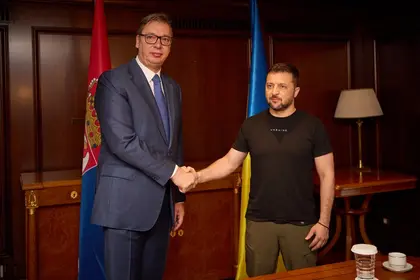Donald Tusk’s government in Poland is facing a major test with a critical presidential election on the horizon. This follows a challenging first year in power, marked by conflicts with President Andrzej Duda and divisions within the governing coalition, which includes his liberal Civic Platform party, the Left, and the center-right Polish People’s Party.
The biggest opposition party, the nationalist Law and Justice (PiS), announced on Sunday that historian Karol Nawrocki will challenge Warsaw’s liberal mayor, Rafał Trzaskowski, in Poland’s presidential election next year.
JOIN US ON TELEGRAM
Follow our coverage of the war on the @Kyivpost_official.
According to polls, the race is expected to be very close. It will most likely culminate in a decisive run-off between the two leading candidates: Rafał Trzaskowski, representing Prime Minister Donald Tusk’s Civic Coalition, and Karol Nawrocki, backed by the right-wing PiS.

Trzaskowski is no stranger to the Polish electorate. The progressive and dynamic mayor of Warsaw has served as both a national and European Member of Parliament, as well as Minister of Digital Affairs and Deputy Minister of Foreign Affairs. His extensive portfolio and the progressive reforms he has pursued as Warsaw’s mayor have made him something of a poster child for educated, urban voters.

How Poland’s Trade with Russia Undermines EU Sanctions and Support for Ukraine

But does Karol Nawrocki have what it takes to mobilize the rural population to vote? After all, the countryside is the true stronghold of the Polish right. Nawrocki has minimal political experience, has never run for office, and has little track record as a public speaker. The question remains whether he can inspire the devout, rural Poles to the same extent as his predecessor, Andrzej Duda. This uncertainty looms large in Poland, with the next few weeks shaping up to be a make-or-break moment for the candidate. If Nawrocki falters, PiS leader Jarosław Kaczyński still has time to replace him before the legal deadline on Jan. 5.
On the road to nowhere
Under Poland’s 1997 constitution, the president holds the power to veto any legislation passed by parliament. Unless the ruling coalition also wins the presidency, the government will remain unable to implement significant reforms. This gridlock could paint the coalition as ineffective, ultimately giving PiS a significant political boost.
Expectations for the government are enormous, and the pressure continues to mount. Poland has the strictest abortion laws in Europe and some of the continent’s most oppressive legislation against the LGBTQ+ community, ranking alongside authoritarian states like Belarus and Russia (as indicated by ILGA-Europe’s Rainbow Map).
These policies are increasingly out of sync with Poland’s rapidly modernizing society. However, electing a liberal president may not bring the sweeping changes many voters hope for. The center-right Polish People’s Party has already announced that it will veto any meaningful reforms regarding women’s or minority rights.
This means that regardless of who wins the presidential election, expected in May 2025, tensions between the left and right factions of the coalition are likely to boil over, potentially reaching a breaking point. The second half of 2025 could be plagued by political chaos.
For now, coalition partners must present a united front to avoid losing the presidency to Karol Nawrocki and the widely despised PiS party. But once the election results are announced, all bets are off, and a storm of internal conflicts is almost inevitable.
Security first
Fortunately for Poland’s international partners, domestic political turmoil is unlikely to affect its foreign relations. While liberals lean more toward the EU and conservatives look to the US, the differences are relatively minor. Both Tusk and Kaczyński view the US as the cornerstone of Poland’s security, fully aware that Europe alone is not yet capable of halting Russia’s imperial ambitions.
On the issue of Ukraine, both candidates are expected to continue Andrzej Duda’s staunch support for the country, serving as vocal advocates for Ukrainian interests within the EU and NATO. Across Poland’s political spectrum, there is a shared understanding that stopping Russia in Ukraine is crucial to preventing conflict from spilling into Poland. As a result, themes like “security,” “Europe’s largest land force,” and “military modernization” are likely to dominate the candidates’ campaign speeches.
Last year, inflation was the top concern for Poles. However, the national mood has shifted significantly. While inflation remains among the top five concerns, fears of the war in Ukraine spreading onto Polish territory have surged. A year ago, this worry ranked sixth; today, it is the top concern, cited by 40% of respondents.
Michał Piękoś is a Polish journalist and columnist, and editor-in-Chief of the Trybuna daily newspaper. He worked as editor of MSN News in Berlin and editor-in-chief of the news website wPunkt. He is a political commentator on Polish Radio 24 and a member of the Polish Association of Journalists.
You can also highlight the text and press Ctrl + Enter






